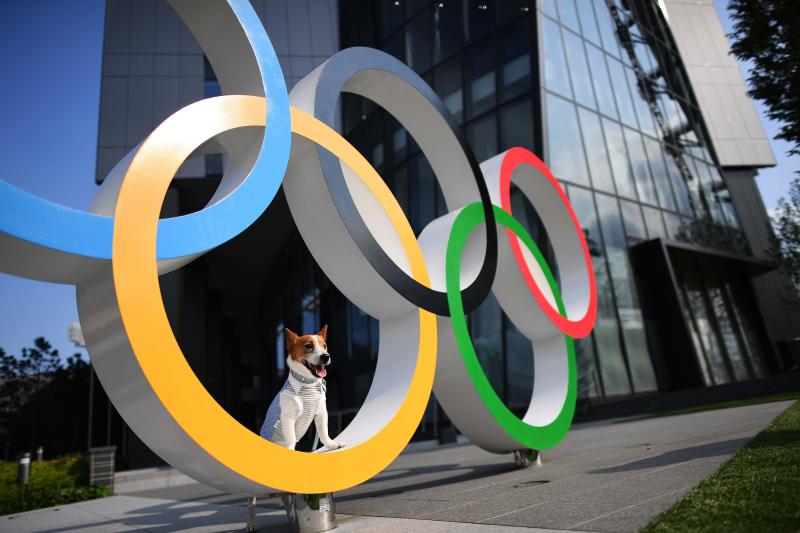One year to the Olympics: Tokyo on track for largest and most eco-friendly Games yet
Sign up now: Get insights on Asia's fast-moving developments

The Tokyo Olympic Games will run from July 24 to Aug 9 next year, before the Paralympics takes place from Aug 25 to Sept 6.
PHOTO: AFP
Follow topic:
TOKYO - Marathon preparations for next year's Olympic Games have entered the final lap, as Tokyo on Wednesday (July 24) kicked off a year-long countdown to the marquee sporting event.
The Tokyo Olympic Games will run from July 24 to Aug 9 next year, before the Paralympics takes place from Aug 25 to Sept 6.
It is set to be the biggest Olympics yet, featuring a record 33 sports over 339 events taking place at 43 venues.
Tokyo has sought to keep a lid on a swelling budget - and the risk of post-Games "white elephants" - by tapping existing venues as far as possible.
While its budget was 700 billion yen (S$8.8 billion) when it made its winning bid to host the Games, later estimates said up to 3 trillion yen would be needed if all planned projects are carried out.
Spending is now expected to hit 1.35 trillion yen.
Construction and refurbishment of Games venues - comprising eight new sites, 10 temporary ones and 25 existing venues - are on track.
It includes the landmark Olympic Stadium designed by famous architect Kengo Kuma, which will be ready by year end.
"We are making excellent progress," International Olympic Committee chief Thomas Bach said in Tokyo on Wednesday.
"I can truly say I have never seen an Olympic city as prepared as Tokyo with one year to go before the Olympic Games."
The Games are also set to be the most futuristic - humanoid robots will be deployed to assist spectators, athletes and officials at competition venues - and most eco-friendly.
On Wednesday, the Games Committee unveiled the winners' medal design, selected from more than 400 public entries.
About 5,000 medals will be made from 32kg of gold, 3,500kg of silver and 2,200kg of bronze extracted from 78,985 tonnes of donated items, including used mobile phones and other small electronic devices.
Singapore Prime Minister Lee Hsien Loong had also donated an old mobile phone on a previous visit to Tokyo.
Although podiums have traditionally been made using wood, about 45 tonnes of plastic waste material will be used to create 100 podiums under the Everybody's Podium Project.
Japan has, meanwhile, billed the Olympics as the "Reconstruction Games" to showcase the strides made in recovery since the devastating 2011 Great East Japan Earthquake.
This week, two Japanese astronauts were named space ambassadors and are set to broadcast messages of support from the International Space Station during the Olympics torch relay.
The relay, which will flag off on March 12 in Fukushima and end in Tokyo on July 24, will pass through all 47 of Japan's prefectures including the northernmost Hokkaido and southernmost Okinawa.
Japanese Prime Minister Shinzo Abe said on Wednesday: "The Olympic Games are significant for fostering connections among people from around the world.
"We want to create a warmth-filled event by building bridges between the participating countries and regions with the local governments."
He added: "Each and every one of us are inspired by athletes who challenge their limits. With preparations advancing, I look forward to sharing these emotions together next year."
Also on Wednesday, Emperor Naruhito formally assumed the symbolic title of honorary patron for the 2020 Games.
Tokyo 2020 president Yoshiro Mori said that the Emperor will act as a "hugely positive force in terms of promoting the values of the Games, including peace, friendship, the support for reconstruction of disaster-hit areas, and the Paralympic Movement's message of diversity".
He added: "The Games will also provide a great opportunity to deepen the friendship and solidarity between people all over the world and for us to reflect on the preciousness of peace."
Still, this celebratory mood on Wednesday was soured by a war of words between Japan and South Korea, which have been sparring over historical and trade disputes.
Territorial issues have again entered the ring.
Tokyo last year protested to Seoul after it used maps showing the contested Dokdo/Takeshima islets as South Korean territory at the PyeongChang Winter Games last year.
This time, Japan has rejected South Korea's protests on the matter, as well as an objection by Seoul of maps that label the sea between the two neighbours only as Sea Of Japan, without using its preferred designation of East Sea.
Chief Cabinet Secretary Yoshihide Suga told a regular news conference: "We communicated to them that their position is absolutely unacceptable."
Tokyo Governor Yuriko Koike told a news briefing last week that she hopes the Olympic Games can act as a springboard for a more intangible legacy for the country.
When Tokyo last hosted the Olympic Games in 1964, it wowed the world with an infrastructure boom that featured the dawn of the Shinkansen bullet train, and left behind a cultural legacy with the first-ever use of pictograms to indicate everything from toilets to sporting events.
This time, as Tokyo becomes the first city in the world to host the Paralympic Games twice, Ms Koike said she wants the Games to fuel the acceptance of a barrier-free society and more flexible working systems.
Businesses in Tokyo as well as the central government this week launched a trial "Smooth Biz" campaign to see how it can ease traffic jams and railway congestion during the Games, by promoting telecommuting and staggered working hours.
Olympics Minister Shunichi Suzuki, who usually goes to work by car, took a subway on Monday to the Cabinet Office.
He told reporters after arriving for work at 11.30am, under the staggered working hours system: "We can't tell people not to use cars if government officials use official cars."

